The writer of this essay asked to remain anonymous because they did not get prior approval from management to contact media. It was submitted as part of a community project to keep BikePortland going while BikePortland Editor & Publisher Jonathan Maus is tending to a family medical emergency out of town and unable to work as normal.
I’ve seen the sun rise more in the last six months than I have in the preceding 46 years of my life. Most days I wake up in the 4 o’clock hour to start my shift as a bus driver for TriMet. The pre-dawn risings began on the first day of training, when I rode my bike to Center Garage, TriMet’s main bus depot off Southeast 11th and Holgate, for a 6:00 am report time. This newfound appreciation for dawn isn’t the only thing I’ve learned in the last six months.
Training camp
On day three, I was behind the wheel of a bus on public streets with real cars, real pedestrians and real responsibility.
The training program for bus drivers is truly incredible. TriMet is a national leader in operator training, regularly receiving visitors from other agencies. Over seven weeks, trainers teach greenhorns to safely and efficiently navigate a 30, 40, and even 60-foot bus through narrow and often unknown streets, making turns in unfamiliar intersections in the dark of the night with rain-blurred visibility. The learning curve is steep: On day three, I was behind the wheel of a bus on public streets with real cars, real pedestrians and real responsibility. For the first few weeks, I would come home from a day of driving completely mentally and physically exhausted. Suffice to say: When you see “TRAINING BUS” on the overhead display, give that bus some extra room. Even after drivers are on their own, trainers conduct regular “check rides” to ensure they are following safe driving practices. That’s what’s happening when you see a person in a yellow vest standing near the driver.
There is no question of liability or fault. The only question is if an alert driver could have taken steps to prevent the accident from occurring.
The single biggest technique learned during training is to be constantly scanning. I scan my right and left mirrors every five to eight seconds, making sure to register what I’m seeing and how it may affect my operation of the bus. I scan those same side mirrors twice each when pulling out from a service or traffic stop. I’ve been taught to also look over my shoulder in both directions after servicing a stop to ensure a late-running passenger hasn’t slipped into my mirror’s blind spot. The options for maneuvering a bus are much more limited than a car so I scan way ahead down the road for potential hazards like road construction, cars being erratic, or stopped traffic. It’s also critical that I keep an eye on the overhead mirror inside the bus. I check it whenever someone pulls the cord to see which door they are likely to use, or if they have a large load to manage, or have a mobility issue that may affect where I land the bus at the stop. And of course I watch boarding passengers until they find their seat so I can keep a stable platform to avoid any falls. There’s a nearly unlimited amount of scanning and to do it effectively requires my constant attention.
The theoretical result of all this scanning is that we avoid “preventable accidents”, also known as PAs. If I rip off my side mirror on a tree branch, or catch an illegally parked car’s bumper in a turn, or end up being unable to squeeze down a narrow street due to a trash truck riding over the double yellow line, I get dinged with a PA, which can lead to termination. TriMet holds bus drivers to a completely different standard than state law does for driving a car. There is no question of liability or fault. The only question is if an alert driver could have taken steps to prevent the accident from occurring. If this sounds like an extremely high burden of responsibility, it is. Driving a bus is a big deal. A long-time operator once told me that there are no good drivers, just good driving.

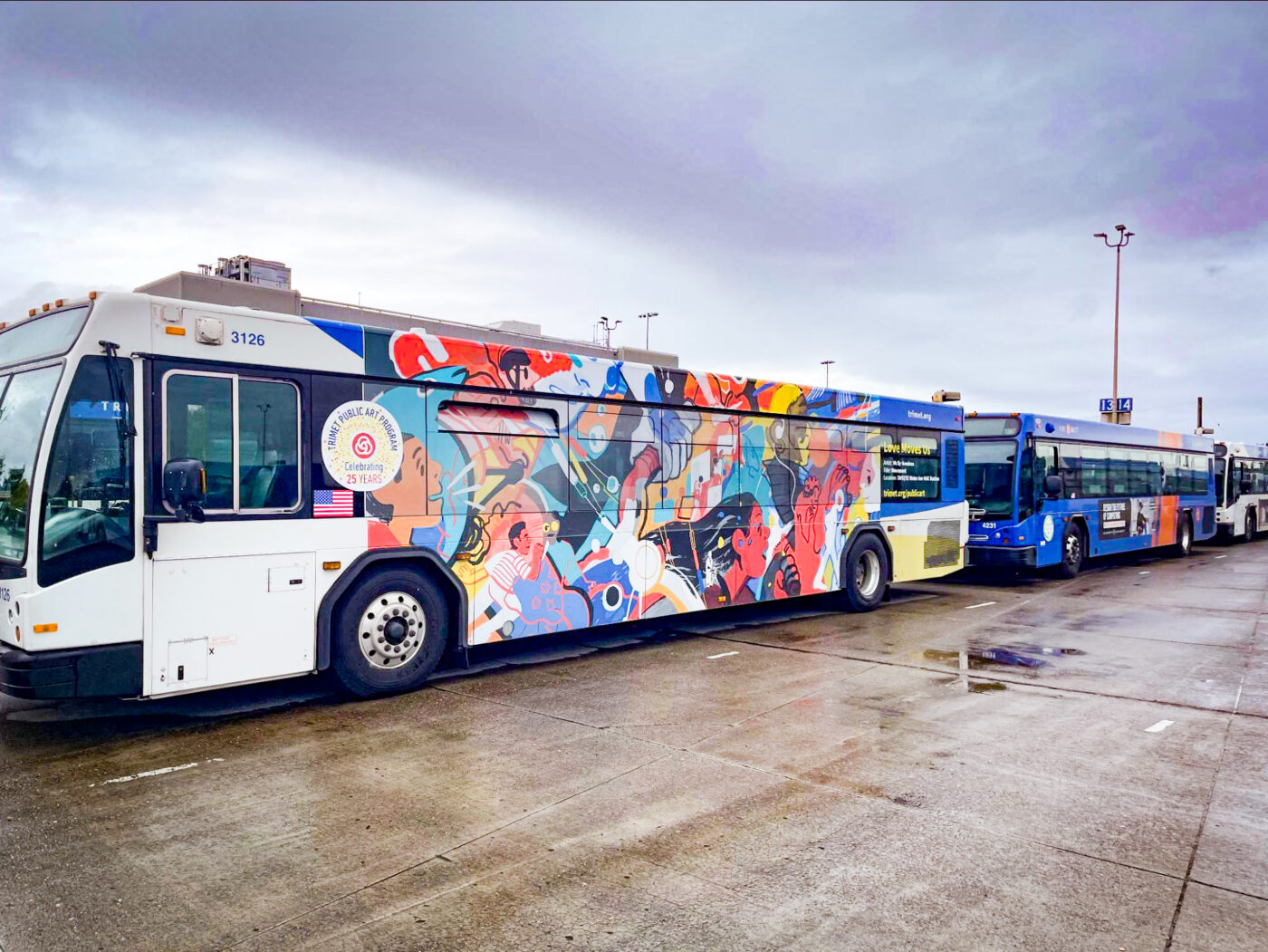
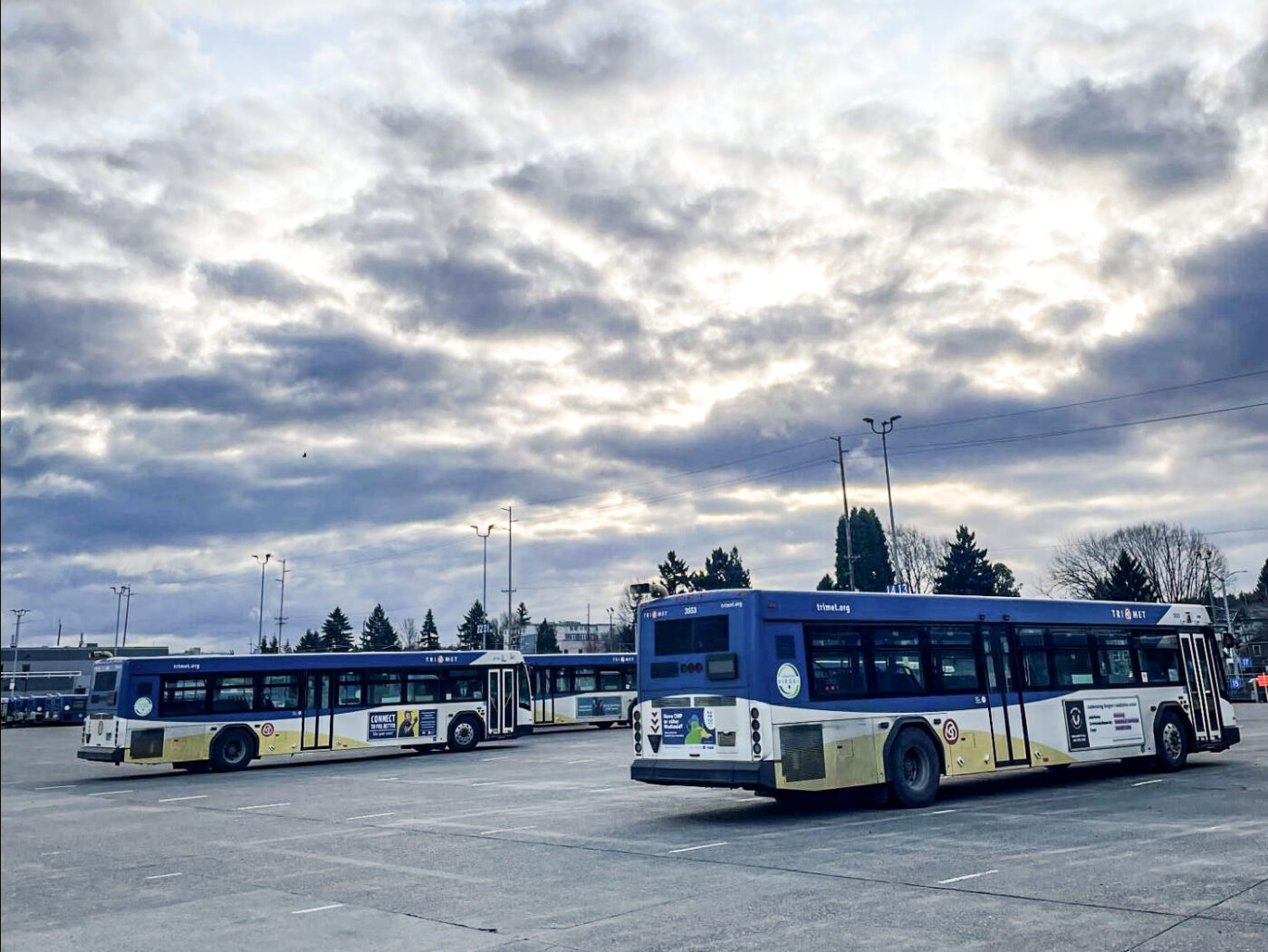
Passengers and payments
When things are going smoothly, it can be really fun to help passengers get where they’re going. Every driver is different but my favorite passengers are the ones who wear a safety vest to catch my eye, wave a hand when I’m approaching to indicate they want a ride, make a little eye contact when boarding, have their fare ready to go, and find their seat quickly. Like most drivers, I don’t care two licks whether or not you pay. I’ve had passengers who paid with a Hop card end up causing problems, and other passengers pitch in to assist riders with mobility issues after asking for a free ride to the Bottle Drop to redeem their cans.
Personally, I appreciate it when passengers put a few coins in the fare box, or pleasantly ask for a free ride. Most drivers are happy to provide a free ride—we’re going that way anyway—so long as you acknowledge the graciousness. (Fare enforcers can appear anywhere, on any line at any time, so you ride at your own risk.) I deeply appreciate the opportunity to have a micro-relationship with everyone and often find that the free riders are among the most helpful in managing a busy bus. Fares are somewhere around 20% of TriMet’s annual revenue so we are taught to focus on ensuring an enjoyable and efficient ride for every customer rather than burning time arguing with someone about a fare. We have a button on our system to record a “fare evasion” and although that data could be used to target fare enforcement missions, it’s mostly used to record ridership counts—a critical data point in securing state and federal funding.
Don’t bother trying to reuse yesterday’s day pass, or feigning ignorance when your Hop card balance is at zero. Just ask for a free ride.
Don’t bother trying to reuse yesterday’s day pass, or feigning ignorance when your Hop card balance is at zero. We can see those little cheats coming before you even get on the bus. Just ask for a free ride.
Another thing I like are all the thank-yous and waves when riders leave the bus. I see your hand waves from the back door when you have your headphones on. I hear your little mumbles of thanks when you’re de-boarding in the middle of a pack. I notice your smiles as you leave through the front door. I don’t often respond, but I see you. I don’t often respond because managing newly-boarded riders, making sure everyone is off who wants to get off, and merging back into traffic is the most intense part of the job—often requiring one hundred percent of my concentration to get it done completely safely with a focus on speed to stay on schedule.
What I don’t see and hear is what happens in the back of the bus, up the steps. Or on the left side behind the driver’s cab. If you are getting bad vibes, or feel uncomfortable with something, or just don’t want to miss your stop, come up to your driver during a stop and say something. If you don’t want to tell your driver, call 503-238-RIDE. As long as the bus isn’t moving, I love helping passengers. Sit on the curbside seats ahead of the rear door so I can keep an eye on you, or call out your stop when it’s coming.
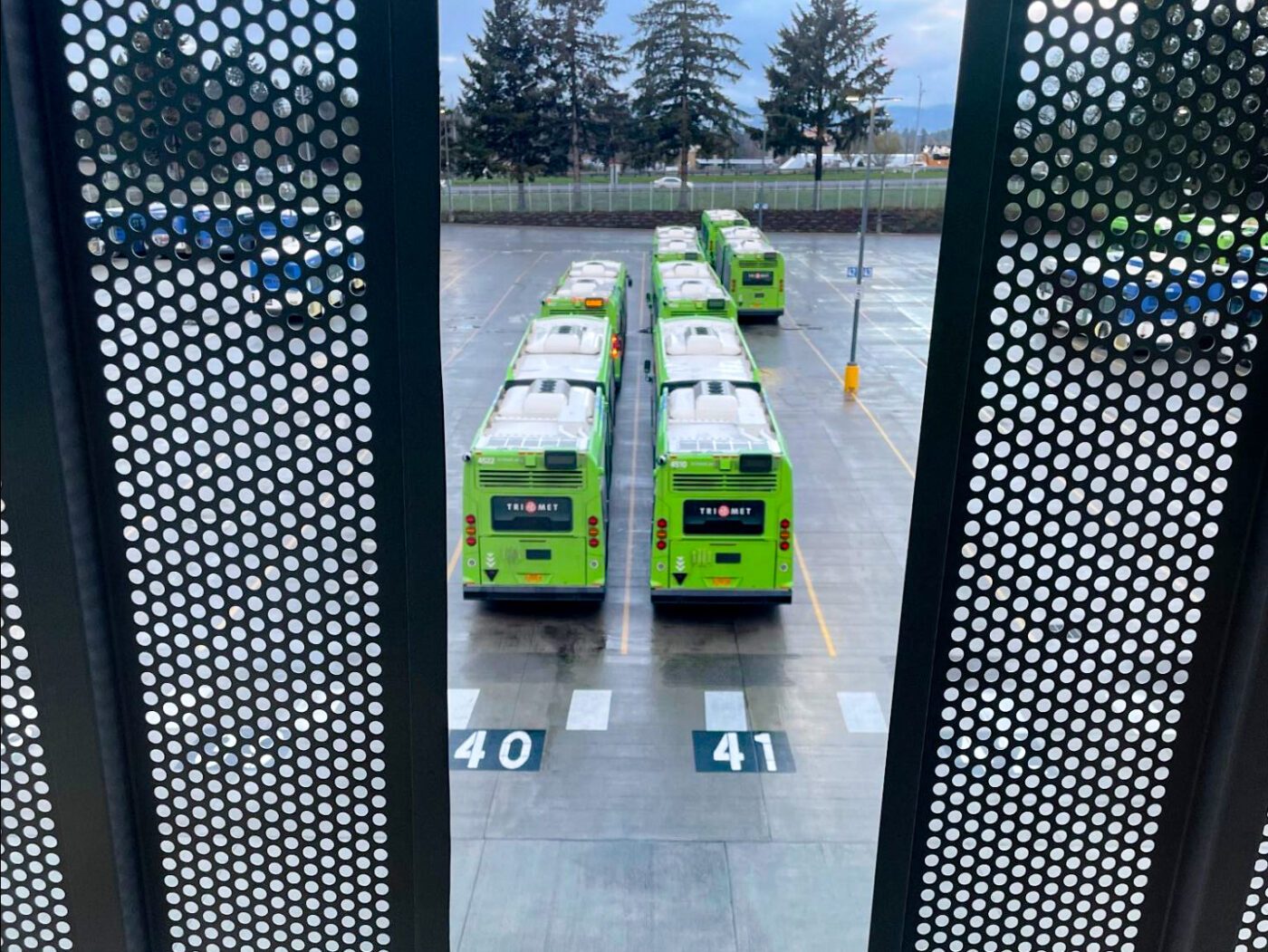

I honestly think that riding the bus is a safe and enjoyable thing. I’m not speaking as a TriMet representative here. I’m sure you’ve heard stories about assaults on drivers and people in a mental crisis making everyone else uncomfortable. And they’re all true, for sure. The bus is a slice of our broader society, nothing more and nothing less. In my six months, I’ve never really felt uncomfortable, for whatever that’s worth to you. And I think my passengers generally enjoy riding the bus.
While I love the tiny relationships I build with regular passengers, they all eventually come to an end. Every three months, all bus operators have the opportunity to sign up for a different work schedule. Some drivers choose to run the same route every day for three months while others work the “extra board” which is a bit of a daily lottery to fill in for buses that don’t have a driver. Some routes never get assigned a permanent driver which means a new driver runs it every day. I rarely work the extra board, but some operators love the variability and do it for years at a time. Instead, I work “vacation relief,” which means I fill in for other drivers on a weekly basis while they are on vacation from their regular work. It’s a great middle ground between getting bored doing the same thing every day and the uncertainty of being on the extra board.
The drivers
TriMet makes a lot of effort to have extra board operators on standby. But sometimes there aren’t enough drivers available for a route and it gets canceled. The driver shortage is real. In 2019, there were over 1000 drivers and service levels were growing. Then came COVID. Our excellent union, Amalgamated Transit Union Local 757, was able to avoid any driver layoffs but many drivers took the pandemic as an opportunity to retire or change careers. Now we are down to about 800 drivers, so it makes sense that service levels have suffered.
At current rates, it will take years to recover to pre-pandemic levels of service.My training class started with 28 people. Only 20 made it through the seven weeks. And with something like 30-50% of new drivers quitting or being let go within the six-month probationary period, TriMet isn’t churning out new drivers too quickly. (Oh and that juicy $7,500 bonus you’ve seen plastered across our in-house ads? It’s paid out over three years.)
The buses (and those back doors)
The back doors suck, let’s just be honest.
There are a lot of different buses to get used to. My favorite ones aren’t the newest. That might sound counterintuitive but many drivers I talk to agree. We like the 3500 and 3600 series buses because the rear doors close the fastest after a passenger gets off. The 4200 buses have a backup camera, but I’ve got worse problems than not being able to see behind me if I need to go into reverse.
The 4000 series models and up have intense red interior lights.They are supposed to help us keep our night vision, but I also think it’s a cool effect.
One thing I wish was standardized is the rear door opening action. Most buses have a motion-sensor eye above the door, by the green light. But some doors have touch-strips on the vertical door handles that you push to open. If I had a nickel for every time someone asks me to open the back doors when they’re already open, I could quit TriMet. I’ve found that the best technique to get the motion-sensor to see you isn’t to push on the doors themselves, but to gently push your whole forearm horizontally across the door. Small and quick stabbing motions with your hands sometimes aren’t seen by the eyes. So then you yell, “Back door!,” and I mutter, “It’s already open, just push!” and then you push and it finally opens (which makes you think that the doors finally opened because of something I did).
The back doors suck, let’s just be honest. I wish I could open and close all the doors all the time like on the green FX buses.
Look for the helpers
If something breaks, or a situation gets bad inside or outside the bus, we can summon help from a supervisor. They are the people driving around or parked at Transit Centers in the little white SUVs. You can tell a supervisor when they’re not in their cars by their light blue shirts. They can solve problems with unruly passengers, do light mechanical fixes, help out us drivers if we are having personal problems, help move things along if we are running late, and handle service disruptions like MAX trains breaking down or road construction interrupting bus stops.
I’ve learn a lot and I enjoy driving a bus much more than I thought I would. I’m now a bigger advocate for buses than ever. If you haven’t ridden a TriMet bus recently, maybe consider giving it another try. And keep up the thank-yous, even if you don’t get a reply. I’m probably scanning my mirrors, watching people move around the bus, and trying to stay on schedule.



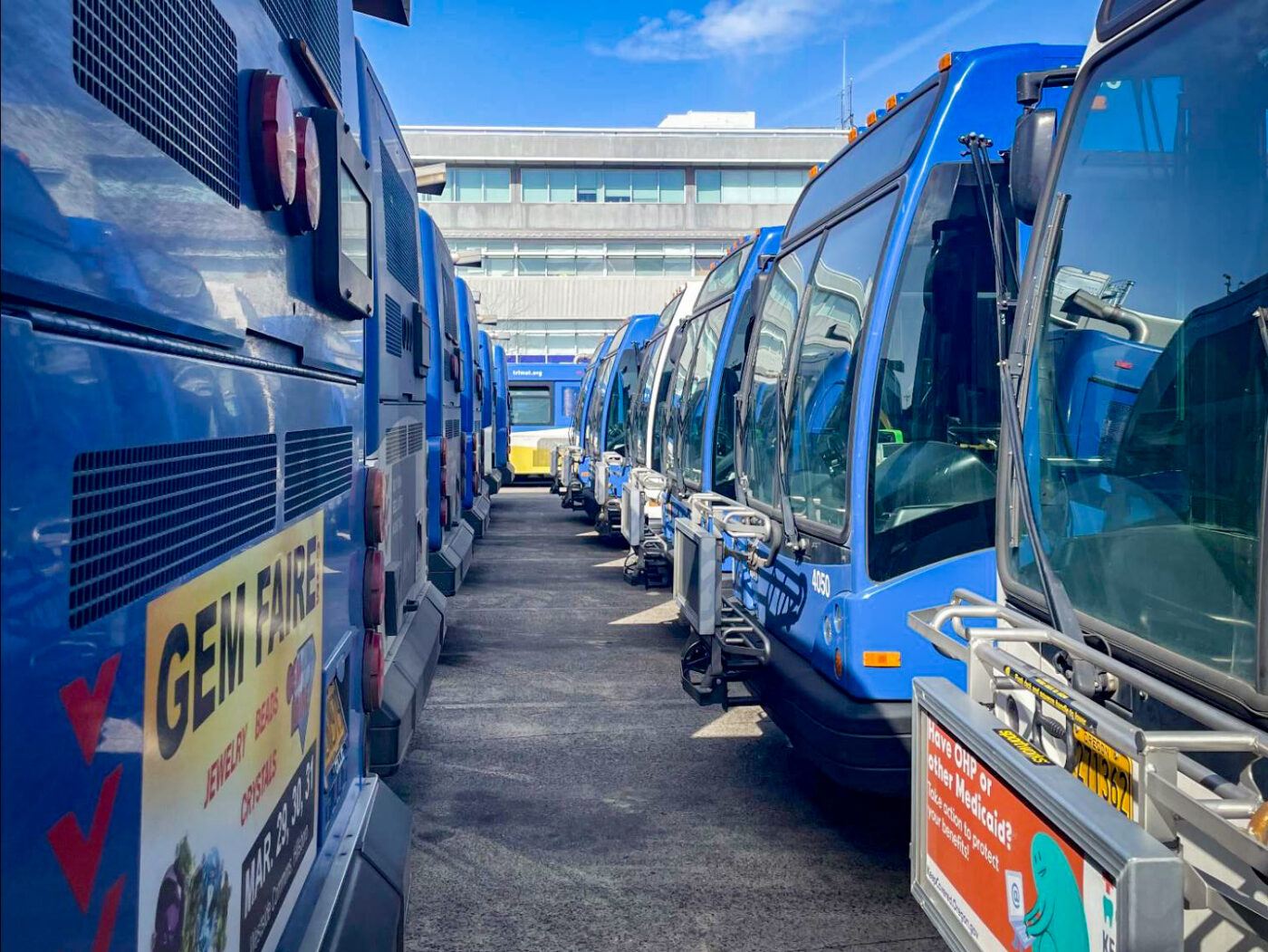

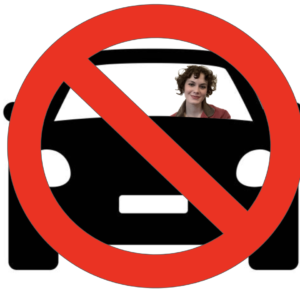

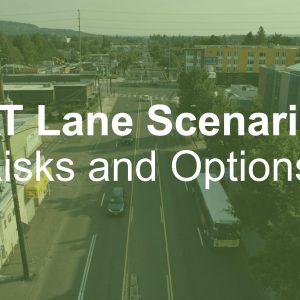
Thanks for reading.
BikePortland has served this community with independent community journalism since 2005. We rely on subscriptions from readers like you to survive. Your financial support is vital in keeping this valuable resource alive and well.
Please subscribe today to strengthen and expand our work.
This bus driver sounds like a man of the people. This is the type of person we could use on the city council.
Or woman (or non-binary or other gender identification). It is an anonymous article, so we don’t know anything about the gender of the bus driver.
So? “man of the people” is just a phrase that’s been around a long time. Must we always be so PC in everything we say and do? Anymore one might as well not say a single word because one person might get offended. My work is that way (weaponizing being offended) and it has really made a hostile work environment.
I disagree with this sentiment. Do you think that a woman or non-binary person would say, “I am a man of the people”? Even if the phrase has been around for a while, the language is unnecessarily exclusive if we don’t know anything about the gender of the author.
ALRIGHT, ALRIGHT, JFC! They’re a real person for the people! Does that drop the hammer back on the trauma trigger? Pick your battles Eric, Person for the people doesn’t quite roll off the tongue now does it? I think we can all agree Mr. or Ms. or Mrs Eclipse made a great point about the qualities evident in this driver, and I would wager that same calculation would have been made had the driver profiled been Female, POC, Trans, LGTBQ, or even a rabid furry for that matter, You kinda injected your need for universal compliance and commitment to performatively regurgitate the current public discourse boiler plate and IMHO that’s folly swiftly steaming towards the mendacity of much adonabout nothing. Eclipse meant no slight or exclusion in his praise of the driver, and quite frankly, your desperate prosecution has kinda put a sour note into the mix. Eric the LAST thing Portland needs right now or pretty much ever is a big stupid war over amongst its citizenry with weapons and tempers combining and succumbing to the crushing weight of who fuckin cares at the end of the day. Eclipse,Eric fist bump this into the past as you both take roles as elder states,men and squash the BS beef and start,rooting for more trimet drivers with attitudes that will go a long way in turning this glorious city around for all of us to enjoy together again.
Of course the writer could be a woman, but the author left a few bread crumbs and I’m pretty sure I know who he is. I thought every bike Portland reader would already have it figured out. It seems pretty obvious (hint: check the BP podcast archives and follow local candidate’s social media accounts), but maybe I’m wrong. I wasn’t trying to be sexist, I just went with my best guess pronoun.
And now that SolarEclipse has mansplained linguistic masculo-normativity to you, I wish anybody could say they were surprised.
How do you know SolarEclipse is a man? Or is mansplained a gender neutral term? Oh the irony! But in all honesty I’ve been reading a bunch of manuals and literature that uses the female vernacular. I haven’t been offended yet and wished it went that way for everyone.
Hi, my (real) name is Matt and my usual pronouns are he/him, but I’ve been referred to with several others and I don’t mind any of them. I am operating under the assumption that SolarEclipse identifies as male, yes; if he says that I’m misgendering him, I’ll unequivocally apologize for that. But yes, women can mansplain too, is a popular opinion.
“mansplained” is an offensive, derogatory term.
I’m a man and I say it’s okay. Further, I (and plenty of women, too) say that suppression of the use of the term is itself a misogynistic act. Checkmate.
This is such a great read. Thanks very much to the bus operator for taking the time to write their story. I split my commute between biking and riding the bus and I have tremendous respect for the drivers. Hope this type of insider perspective column continues as the driver’s career develops.
Thanks, driver! This was a heartening article to read, and I appreciate the care put into writing it. And all the care it reminds us that drivers and the agency must take, consistently, to keep all of us safe. Roll on!
I especially appreciated this line: “there are no good drivers, just good driving.” I will be quoting this hereafter! Sooooo often people rationalize their dangerous behavior by claiming it’s okay for them to do it, because they are a good driver (e.g. texting at a stoplight). The simplicity of this statement reminds all of us that it only matters what we are doing in the moment to keep everyone safe.
What a great essay! TriMet drivers are some of my personal heroes and they have an incredibly difficult and important job. Thanks to this person and all of their colleagues for their work!
The complexities of a bus driver’s work… Respect!
Thanks for the essay and reminder. We already knew TriMet drivers have the best and safest approach to driving, and this article puts a bow on it.
I’ve ridden 50K+ miles in the Portland Metro area and only had one near fatal crash involving a TriMet bus. The driver was 100% at fault.
The author said most bus drivers don’t make it past six months in the job, so I’m guessing your near-fatal was with one of those drivers. I’ve had close calls with buses driven by that same segment, I’m sure.
Thank you, Trimet Driver, for sharing your perspective with all of us.
Now that I am older and slower due to some unforseen health issues, I ride my bike less and take the bus far more often than I used to. I am grateful to live in a city with such a good transit system, and SO grateful for the people who operate all those transit vehicles. They make mobility more accessible and possible for many of us.
I’ve visited and used transit in other cities, and I know firsthand how much worse it could be.
Everyone: Please DO NOT take our transit system and its operators for granted, EVER. This is a benefit of living in a city like Portland. Be kind to transit operators, and speak up and support transit funding whenever and wherever possible. The powers that be need to know that good transit matters and is essential to making a city more vibrant and humane.
I’m always grateful (always say thanks on way out back door) for the drivers, it’s their management that really really sucks.
It’s actually the short-sighted politicians and the auto-oriented
idiotspeople who elect them that really sucks. I live in a city with really poor bus service – half the city has no bus service at all because of a past anti-transit city councilor and continued incompetence and high turnover of our city managers – but our drivers and their supervisors are still as friendly and dedicated as those at TriMet.Buh …. buuuuuuuht I thought the city manager system is supposed to save us!?
Everything will be different in Portland, of course, once you are married to your brand new city manager. But that won’t affect your affair with TriMet as it serves multiple partners.
I really like riding the bus and loved reading this as well! Thanks for giving a little peak on the inside.
Thanks for writing this article. I ride the bus often and I see how bus drivers are foot soldiers in the daily struggle with the fentanyl crisis. Thanks for being out there and trying to make a difference.
Sorry to comment twice but I had a thought I wanted to add (while I’m on the bus home lol)
I think this author does a great job of highlighting the really difficult parts of the job – weird, inconsistent hours; little margin for error; and the challenge of navigating a very large and heavy vehicle through chaotic streets.
It seems to me there’s a narrative that TriMet can’t find drivers because it’s “unsafe”. Seems to me it’s more because the job is just really hard!
I don’t think anyone should diminish the legitimate feelings of operators who feel like the agency doesn’t have their back. However, the “safety paranoia” in the public at large is really unproductive.
Anyway, I’m coming up on my stop so I’m gonna try that arm thing with the back door and give a hearty thank you as I step off.
People riding public transit should pay their fares and the drivers driving the bus should make sure they are collected. I was on a different transit system recently in a bigger city. There were several signs inside and outside the bus ‘No Courtesy Rides’. The experience was a world of difference from what goes on here in PDX: behavior of passengers, feeling of safety, cleanliness of the bus. A seat on a bus might have 40-50 people occupying that seat in the course of the day. PDX recently had an outbreak of Shigella. It’s a bacterial infection that was being spread by contact with fecal matter. Do anyone really think that these buses are carefully cleaned each day? Intra day? The Tri-county bus system, particularly in the core, has evolved into little more than a mobile homeless shelter. It’s a mess and, you know what, you don’t see the fare paying passengers that COULD be riding TriMet. They’re long gone!
This story is over 10 years old, but possibly still relevant:
https://www.kgw.com/article/news/study-trimet-bus-seats-tested-for-bacteria/283-73449661
i vaguely remember that story. I know I’m trashing a demographic here in Portland. Offering generalities about people is inherently unfair and I do have some sympathy, at least, for the down and out. For every person living in a doorway/tent there are ten housed that, to me, are in that same demographic i’m describing as ‘people who do not give a shit’. Transit systems need money to function. Allowing anyone to board transit under any circumstance: no fare, unhealthy/unclean, bringing trash, animals onboard, disruptive . . .. that has a cost that is simply not accounted for to the average Portlander. It’s remarkable that in a city that has such a complete transit system (at least compared to other U.S. cities) ride share, Uber/Lyft and taxi’s do so well. They should be out of business and If you want to get the full picture of why they do so well, try riding the Red line inbound from PDX at about 9:00 in the evening.
Even leaving aside the sociological issues you were discussing, Uber/Lyft will take you where you want, when you want, and will do so without a bunch of stops along the way. It’s inherently a much faster and higher level of service.
Thanks Charles. I think TriMet passes are one of many services available for people willing to accept shelter. Not enabling houselessness with free transit could be another means to encouraging people to accept the help they need.
The author addressed this issue in the essay. You would rather the driver argue with every evader? Refuse to move the bus and wait for enforcement? Or do you expect the driver to be the enforcer? All while making you late to work or late to make that next connection you HAVE to make? Have you ever tried to have a rational conversation with an evader?!
Yeah….all that sounds WAAAYYY better than the driver simply letting the person on!!
Not to even mention the fact that being an enforcer would make their ALREADY TOUGH job that much harder, making the driver shortage that much worse…making you that much later due to service disruptions from a lack of drivers. Yeah….that’s what I thought.
Once upon a time Drivers did enforce the rules. It can and should be done. Just need to get TriMet Management off their rear ends and do something to get back to that way of running the system.
I have no problems with drivers letting folks on for free. It solves a lot of practical issues that others have raised, and as the author/driver wrote, fare paying is a very imperfect filter for problem causers.
We need to get the people causing problems off of transit, and that is a different group from those who don’t pay fare. And I don’t know how to do that. But I do know that until we do, a lot of potential transit riders will stay away.
there is an acknowledged connection between lack of fare payment and problems caused on Trimet.
Maybe you’re right, but I was going by what was written in the article here.
As a bus driver with nearly 10 years of driving, I heartily disagree. Paying fare is a pretty reliable test for whether someone is going to add to the difficulty of my day. The first ~5 years I was with Trimet we checked fares and actually had authority to refuse service. As mgmt has moved to support its drivers less and less, it’s no wonder our system is lacking both drivers and paying passengers.
Not sure what training you went through.
I started in early 2014 and they really emphasized that we are fare informers not fare enforcers.
Well, as an example, The situation with Trimet can be likened to the situation with shoplifting in grocery stores. Take the Stadium Fred Meyer. A year ago it was open season on this store, It wasn’t a case of someone stealing a pack of gum, it was people stuffing their packs with 10-15 cartons on sweets, ice cream (druggies love the sweets). Then the store increased security, started checking everyone’s receipts and the problem has gone down dramatically. A big reason why is that word gets around! the lows get the word that the store is not longer giving it all away for free. So it is with transit. At first it will be difficult but word will get around and the problem will diminish; my opinion at least!
You’re arguing against yourself with this example.
Notice (assuming you’re describing the situation correctly) Fred Meyer “increased security” and “started checking everyone’s receipts” to reduce shoplifting. The people doing that are different than the cashiers collecting money.
In other words, Fred Meyer realized that expecting the people collecting the money to enforce payment would not be smart, so they hired separate staff trained for enforcement to do the enforcement. They chose AGAINST having cashiers checking receipts or confronting shoplifters.
That’s an argument for TriMet to hire people trained in enforcement to enforce fare collection, not an argument for having drivers do it. So it doesn’t make sense to me that you argued against Bjorn for saying exactly that, or for you to say “drivers driving the bus should make sure they (fares) are collected”.
Drivers should focus on safely operating the bus, full stop. They are vulnerable due to the fact that there focus is on safe operation and should not be expected or encouraged to do things that might cause someone to become physically violent. If you want fare enforcement hire someone else to do it, don’t distract the driver with it.
In your opinion, would “safely operating the bus” include intervening if there is a safety issue on board, say one passenger assaulting another?
That’s funny, because I mentioned a city in my first comment above, Las Vegas. I rode on their system a few times and the drivers there didn’t seem to have a problem driving the bus and collecting the fares. Do you know why? It’s because when riders boarded they did so with the expectation that they would be paying their fares!!!!
“Collecting the fares” isn’t the same as “fare enforcement” (Bjorn’s words). It’s one thing to collect money from people who are expecting to pay. It’s another to enforce that people pay who are trying not to pay.
I take the 12 a few times a month to go downtown and this is not representative of my experiences, which have continued to be fine. Although waiting 15-20 minutes sucks.
Try taking the 12 before 6 AM from Parkrose TC to downtown. What a fun ride it is with quite a few boarders not paying and then acting out. Great your experiences are all fine but mine haven’t been.
Of course it was much worse on the MAX at that time as it appeared security/fare checkers/whomever doesn’t work early in the morning.
Terrific article. I love the details. Riding the bus I’m always trying to figure out stuff like how the back doors work (or don’t). The red interior lighting for night vision I never would have guessed. Thank you!
Preach! As always…”THANK YOU!!”
Great perspective……………thank you.
Your hint about opening the back door improved my life! Thank you!
It’s too bad they are such a bad design as I routinely see people trying to open the back doors without success, give up, and leave through the front door.
My “hint” is I always touch the strips with my bare hands after I see the green light and hold. When I hear a click I push. Only failed once in many years to open for me.
A salient point here is that fairs account for only 20% of the annual revenue. Perhaps we ought to look for alternate ways to fund that portion of the revenue. Dispense with fares and free up inspectors to perform more safety-oriented operations.
Man the back doors are the worst part of Trimet.
I’ll be honest, I was one of those assholes yelling “back door” because in King County Metro, even their Gilligs, the driver opened and closed the doors.
I will never understand why TriMet skimped on air powered backdoors.
What an amazing and insightful article from “the Anonymous Driver”. That was so heartfelt and considerate. I am a weekly trimet bus & max line customer. I enjoyed every ride, the drivers/operators as well as the other passengers. Thank you sincerely for taking such great care of me, and all others aboard.
I’ve often thought about becoming a bus driver for Trimet, in fact I found this article by googleing “Driving for trimet possible without owning a personal vehicle” I drive a smaller bus for a different company, but make a little less than what Trimet starting wage is. One thing that bothered me about the article is how many people that seem to quit, or get “let go.” I know I’m a good employee and responsible driver. I guess the fear of leaving my decent job for a better paying job with such a high failure rate kind of keeps me from applying at Trimet. I guess I don’t need to own a personal vehicle to work for them though.